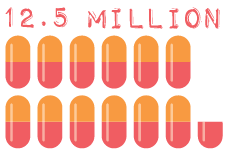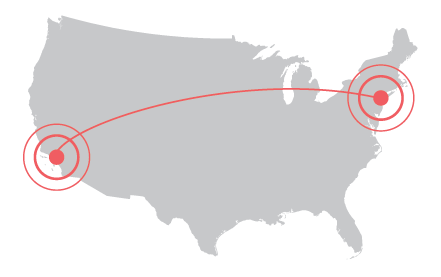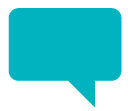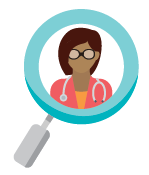You are here
Risky Business: Prescription Drug Misuse
Prescription medications are an important part of treating many health issues and are used effectively by millions of people; however, when misused they become the problem instead of the solution. We’ll look at some of the most commonly misused prescription drugs: opioid pain killers, tranquilizers (used for anxiety and muscle spasms), sedatives (used for sleep disorders), and stimulants (used for ADHD and obesity).
What do we mean by "misuse"?
Misuse is when a person uses a prescription drug that is not intended for them, or uses a prescription in a way that is different than how the doctor indicated (using larger amounts, taking it more often, or using it for longer than prescribed).
How many people misuse prescription drugs?
 |
of people aged 12 and older misused prescription drugs in the past year. [1] |
What kinds of prescription drugs are people misusing? [2]
 |
people misused opioid pain relievers |
 |
people misused tranquilizers |
 |
people misused stimulants |
 |
people misused sedatives |
Misuse is higher among people with mental illness
| People with mental illnesses are |  |
more likely to misuse prescription drugs.[3] |
How does misusing prescription drugs affect mental health?
 |
Opioid pain relievers, tranquilizers, stimulants and sedatives all have the potential to lead to addiction. |
 |
Prescription drug misuse may cause people to experience symptoms of mental health disorders. These symptoms generally improve after a person stops using the drugs, but may take a month or more to go away completely.[4] |
 |
Drugs that slow down or calm people can cause symptoms of depression when misused. If a person goes into withdrawal from these drugs, they are likely to have anxiety.[5] |
 |
Drugs that act as stimulants can cause symptoms of psychotic and anxiety disorders when misused. If a person goes into withdrawal, they are likely to have symptoms of major depression.[6] |
 |
Opioid pain relievers, tranquilizers, stimulants and sedatives may all cause sleep and sexual troubles.[7] |
Why do people misuse prescription drugs?
People who misuse prescription drugs may be self-medicating to control symptoms of an existing (and possibly undiagnosed) physical or mental health disorder, or because they like the way the drugs affect them and think they are safe to use.
 |
| believe that using prescription drugs to get high is safer than using street drugs. [8] |
Are you experiencing a prescription drug use disorder?
It is always dangerous to use prescription drugs that do not belong to you or in a way that is not prescribed. Use the checklist below to determine if you may have a serious problem with prescription drugs.
- Used prescription drugs in large amounts or for longer than intended?
- Wanted to stop misusing prescription drugs, but were unsuccessful in your attempts to quit?
- Spent a great deal of time getting, using, or recovering from prescription drugs that you have been misusing?
- Had strong cravings or urges to misuse a prescription drug?
- Failed to perform work, school, or home duties because of misuse?
- Continued to misuse despite it causing problems with relationships?
- Stopped participating in activities you used to enjoy because of prescription drug misuse?
- Misused prescriptions in dangerous situations (driving, etc.)?
- Continued misusing prescription drugs despite physical or mental health problems that it has caused or made worse?
- Developed a tolerance (needed more to get the desired effect) to a prescription you were misusing ?
- Felt withdrawal symptoms when you stop misusing prescriptions possibly using again to relieve your discomfort?
If you have experienced two or more of the following signs in the past year, you may have a prescription drug use disorder.[9]
How common are prescription drug use disorders?
OVER 3.2 MILLION PEOPLE |
| met the criteria for a prescription drug use disorder in the past year. [10] |
 |
|
That’s enough people to hold hands from New York to Los Angeles. [11] Less than half received treatment. [12] |
What can you do about prescription drug misuse?
 |
Use medications as directed. |
 |
Talk to your doctor about non-addictive options for treating the condition that you are being medicated for if you feel at risk for misusing your prescription. Also make sure to consult your healthcare provider before adjusting medication dosage. |
 |
Store medications in a safe place where they cannot be accessed by others who many want to use them inappropriately. |
 |
Call 911 or get immediate help if you or a loved one have a medical emergency related to prescription drugs. |
 |
Properly dispose of expired or unused medications. Over half of people who misused prescription pain relievers got them from friends or relatives. [13] Walgreens has over 600 safe medication disposal kiosks in 45 states. To locate a disposal kiosk, visit: bit.ly/kiosk2017. If there is not a kiosk located in your area, you may call the DEA's Registration Call Center at 1-800-882-9539 to find a collection receptacle for unused or unwanted prescription drugs. |
If you need help
 |
Take the substance use screen at mhascreening.org. Use the results to start a conversation with your health care provider. |
 |
Seek specialized treatment. You can find treatment providers for substance use problems using the online SAMHSA Treatment Locator at findtreatment.samhsa.gov or by calling the SAMHSA 24/7 Treatment Referral Line 1-800-662-HELP(4357). |
If you or a loved one is in a mental health crisis, please either visit your local Emergency Room, call 911, reach out to The National Suicide Prevention Lifeline's 24 hour toll-free crisis hotline, 1.800.273.TALK (1.800.273.8255), or text "MHA" to 741741 to receive text-based crisis help.
Sources
[1,2,10,12,13] SAMHSA. Prescription Drug Use and Misuse in the United States: Results from the 2015 National Survey on Drug Use and Health.https://www.samhsa.gov/data/sites/default/files/NSDUH-FFR2-2015/NSDUH-FFR2-2015.htm
[3] SAMHSA. Center for Behavioral Health Statistics and Quality, National Survey on Drug Use and Health, 2014 and 2015.
[4,5,6,7,9] American Psychiatric Association: Diagnostic and Statistical Manual of Mental Disorders, Fifth Edition. Arlington, VA, American Psychiatric Association, 2013.
[8]The Partnership Attitude Tracking Study: Teens and Parents 2012, The Partnerhsip for Drug-Free Kids. www.drugfree.org/wp-content/uploads/2013/04/PATS-2012-FULL-REPORT2.pdf
[11] http://www.howmanyisthat.org/compare/bullying - holding hands









this page